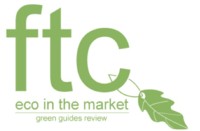U.S. Federal Trade Commission Issues Revised "Green Guides"
 The long awaited revisions of the the U.S. Federal Trade Commission’s ‘green guide’ were released last week in a move designed to help marketers ensure that the claims they make about the environmental attributes of their products are truthful and non-deceptive.
The long awaited revisions of the the U.S. Federal Trade Commission’s ‘green guide’ were released last week in a move designed to help marketers ensure that the claims they make about the environmental attributes of their products are truthful and non-deceptive.The revisions reflect a wide range of public input, including hundreds of consumer and industry comments on previously proposed revisions. They include updates to the existing Guides, as well as new sections on the use of carbon offsets, “green” certifications and seals, and renewable energy and renewable materials claims.
“The introduction of environmentally friendly products into the marketplace is a win for consumers who want to purchase greener products and producers who want to sell them,” said FTC Chairman Jon Leibowitz.
“But this win-win can only occur if marketers’ claims are truthful and substantiated. The FTC’s changes to the Green Guides will level the playing field for honest business people and it is one reason why we had such broad support.”
In revising the Green Guides, the FTC modified and clarified sections of the previous Guides and provided new guidance on environmental claims that were not common when the Guides were last reviewed.
The new the Guides caution marketers not to make broad, unqualified claims that a product is “environmentally friendly” or “eco-friendly” because the FTC’s consumer perception study confirms that such claims are likely to suggest that the product has specific and far-reaching environmental benefits.
The Guides also:
•advise marketers not to make an unqualified degradable claim for a solid waste product unless they can prove that the entire product or package will completely break down and return to nature within one year after customary disposal;
•caution that items destined for landfills, incinerators, or recycling facilities will not degrade within a year, so marketers should not make unqualified degradable claims for these items; and
•clarify guidance on compostable, ozone, recyclable, recycled content, and source reduction claims.
New Sections.
The Guides contain new sections on: 1) certifications and seals of approval; 2) carbon offsets, 3) free-of claims, 4) non-toxic claims, 5) made with renewable energy claims, and 6) made with renewable materials claims.
The new section on certifications and seals of approval, for example, emphasizes that certifications and seals may be considered endorsements that are covered by the FTC’s Endorsement Guides, and includes examples that illustrate how marketers could disclose a “material connection” that might affect the weight or credibility of an endorsement.
In addition, the Guides caution marketers not to use environmental certifications or seals that don’t clearly convey the basis for the certification, because such seals or certifications are likely to convey general environmental benefits.
Finally, either because the FTC lacks a sufficient basis to provide meaningful guidance or wants to avoid proposing guidance that duplicates or contradicts rules or guidance of other agencies, the Guides do not address use of the terms “sustainable,” “natural,” and “organic.”
Organic claims made for textiles and other products derived from agricultural products are covered by the U.S. Department of Agriculture’s National Organic Program.
The Green Guides are not agency rules or regulations. Instead, they describe the types of environmental claims the FTC may or may not find deceptive under Section 5 of the FTC Act. Under Section 5, the agency can take enforcement action against deceptive claims, which ultimately can lead to Commission orders prohibiting deceptive advertising and marketing and fines if those orders are later violated.
You can return to the main Market News page, or press the Back button on your browser.

